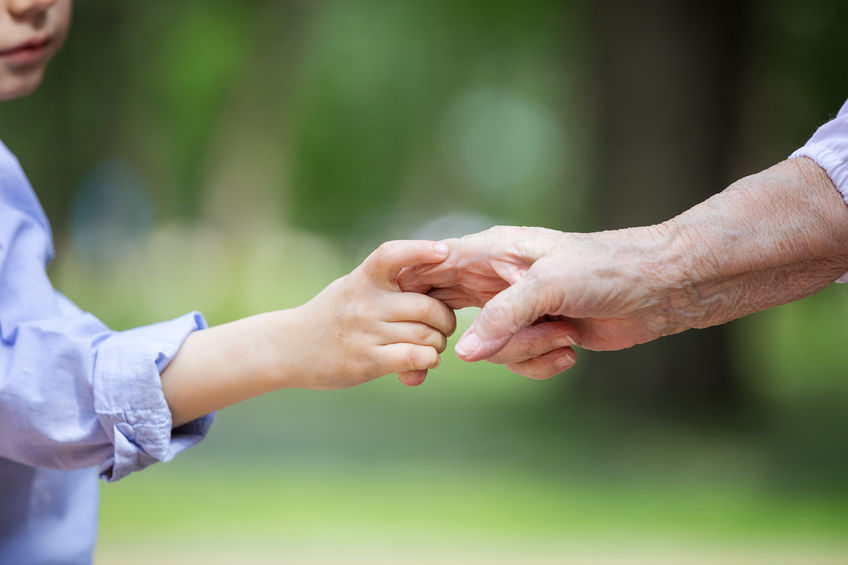
Grandparents Step In, Change the World
-- By Kerry J. Bickford, SADOD Newsletter Editor -- Sixteen years ago, the trajectory of our lives changed when my husband and I became custodial guardians of our grandson, who was four months old and straight out of the neonatal intensive care unit. A few years later, his older sister (age 3) joined us, and we have been a family unit ever since, one of approximately 2.6 million grandparents raising their grandchildren across the country, and one of 30,000 in the state of Massachusetts.
While the story behind this is really our grandchildren’s story to tell, there is a lot that we have shared publicly and continue to share. The children knew their mother was “sick,” and we talked openly and gently about the disease of addiction. We helped them understand it didn’t diminish her capacity to love them, but it did diminish her ability to care for them and keep them safe. They understood then, as they do now, that our intention was never to keep them away from her; rather, we had hoped it would give her time to recover and become part of their lives again. Sadly, this never happened, and the children's mother died in 2010, after a hard-fought struggle with opioids.
When our grandson first came to live with us, my husband and I were both working full-time and had a 16-year-old son in high school. We didn’t know anyone else who was raising their grandchildren, but the wagons circled around us pretty quickly as people learned what we were doing and provided us with a safety net of love and support. Even so, I can tell you there were some tough times and very few resources for us in the beginning, and it was some time before I finally went public with the fact that we were raising our grandchildren. There was and continues to be a perplexing stigma around the disease of addiction, and families are often silenced by fear of shame and/or rejection by their friends, family, and community.
In 2009, I was appointed to Governor Patrick’s newly formed Commission on the Status of Grandparents Raising Grandchildren, which gave me an opportunity to listen to stories and help improve services for grandfamilies across the state. It was immediately apparent that an overwhelming number of grandfamilies were assuming custody as a result of drug-related issues by one or both of the children's parents. A 2019 study confirmed that 80% of Massachusetts grandchildren being cared for by their grandparents were related to substance abuse.This was something we had anecdotal evidence of for years, but finally we had evidence. Addiction was literally tearing families apart.
The disease of addiction takes families on a complicated journey, marked by loss upon loss. In some cases, we are grieving ongoing losses in the lives of adult children who are still with us, while in others we are grieving the loss of a child who died by overdose. The carnage of addiction will never be erased, and we can’t help but look at our grandchildren and wonder, will it happen to them?
I worried about that so many times, yet Kaileigh recently graduated with honors and is off to college in the fall in pursuit of a career in criminal justice. Her brother is two years behind her, and although he is a typical teen in every way — including testing his boundaries -- he is doing well in school, plays sports, and seems to be on track. We are beginning to see light at the end of the tunnel as we head into the homestretch. While we had to delay a few of our own hopes and dreams in order to help them pursue theirs, I don’t think either one of us would do it any differently. Our investment of love, time, energy, financial resources, and perseverance is finally paying off.
Grandparents who find themselves suddenly parenting again often ask for advice about our own experience as custodial grandparents. I sense the desperation they are feeling, and my first response is to recommend a support group to anyone traveling this path. Finding support is a good way to practice self care and keeps us from functioning on physical and emotional reserves.
In the groups I facilitate, we share openly and honestly — and we listen. There is no judgement. Having a safe place to vent, seek reassurance or even express our rage helps us to know that we are not alone. In my group, we also laugh. As Khalil Gibran said, “the well from which your laughter rises was oftentimes filled with your tears.”
We never expected to be raising our grandchildren, nor did we expect to become parents who would lose a brilliant and beloved child to an overdose a year and a half ago, yet both of these things happened to us. Perhaps addiction has caused tragedy in your life, or in the life of someone you know. We know first hand how hard it is not to take it personally and blame yourself for what went wrong. If you remember anything, please remember this: the things that happen to us do not define us. We define ourselves by the actions we take when confronted with difficult and tragic circumstances.
We look at our grandchildren and realize how lucky we are. We honestly tell people that we don’t know who saved whom. Focusing on them has been a lifeline for us-- as much as it has been for them -- and it has been an antidote to the grief we have all endured. Our hearts might be heavy, but we remember the love, and move forward.
Mother Teresa said, “If you want to change the world, go home and love your family.” That’s what we’re doing.
